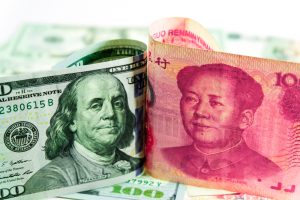As President Donald Trump presides over geopolitical shape-shifting as the poster boy of separatist politics, the most significant clapback yet may be loss of confidence in the U.S. dollar. The dollar has been politically weaponized in the service of American interests and now other global powerhouses are betting on taking back control of their economies by phasing out the dollar as the de facto medium of international trade.
Also read: Over 900 Retailers Worldwide Now Accept Bitcoin Cash
Rival Countries Gang up to Seek U.S. Dollar Replacement
Over the past year, China, Russia, India, Iran and Turkey, countries predominantly on the receiving end of U.S. economic sanctions and trade conflicts, have either disapprovingly reassessed the hegemony of the dollar as the global reserve currency or started de-dollarizing their trade relationships.

Although cryptocurrency has not been tabled as an alternative, loss of confidence in the dollar is symptomatic of the political entanglements of fiat currencies and places decentralized digital currencies like bitcoin at the right side of history.
In a recent article, RT profiled a few countries opposed to the dollar and detailed what they are doing to cut back on dollar dependence. Unlike other dollar skeptics, India does not come across as a U.S. rival, but the populous country is taking measures to ensure that American sanctions do not get in the way of its trade partnerships.
According to RT, the Asian giant had to switch from the dollar to the rupee earlier this year for a military procurement from its BRICS partner, Russia, as well as for sanctions-hit Iran’s crude oil. A currency swap agreement between India and United Arab Emirates is part of a trend that China and Russia have also utilized to do away with the U.S. dollar as a medium of exchange.
China Looks to the Yuan
China’s international ambitions include wider circulation of the yuan, which is already on course following the adoption of the currency, along with the dollar, the Japanese yen, the euro, and the British pound into the IMF’s currency basket. China’s gradual de-dollarization may be hastened by the current trade tiff between Beijing and Washington.

Steps taken to this end include reducing the country’s share of U.S. treasuries, introduction of swap facilities in participating countries to promote yuan use in the developing world, and stronger trade among South East Asian neighbors.
Russian President Vladimir Putin has rapped the US as “making a colossal strategic mistake” by undermining confidence in the dollar. Although the Kremlin, a frequent target of U.S. sanctions, has not made an outright call for ditching the greenback, its finance ministry has been phasing out the currency in favor of the ruble, the euro, and precious metals, which it considers to be more secure.
Online banking solutions Visa, Mastercard, and Swift are also getting replaced in Russia by a national payment system in retaliation against an anticipated round of U.S. sanctions. Mastercard and Visa are not new to complicity with U.S. interests. Interestingly, BTC emerged as a politically agnostic payment alternative after the two institutions froze Wikileaks editor Julian Assange’s accounts.
The Cryptocurrency Refuge
Barack Obama left office with the Iran nuclear deal as one of his masterful diplomatic strokes, and a peace effort for his otherwise war-weary tenure. Trump was not eager to inherit the deal, renewing sanctions against Tehran with a nod from Tel Aviv. In addition to the currency switch arrangement with India for oil exports, Iran has also entered a barter trade arrangement with neighboring Iraq. The Islamic Republic has also spoken about the introduction of a national cryptocurrency to circumvent the sanctions.

Turkey, which is enduring increasingly frosty relations with Washington, has been vocal about switching to alternative currencies for transactions with Iran. Dollar-free trade with China, Russia, and Ukraine is also being worked out.
In Africa, where issues of aid are tied to a series of often unreasonable demands, the dominance of the United States dollar as a settlement currency is already being challenged by emerging payment methods in financial technology and by native African fiat currencies. In the four years to 2017, fewer people in the continent of 1.2 billion transacted via the U.S. dollar than with their local currencies or mobile money, and perhaps cryptocurrency.
Virtual currency has in the past emerged as a solution to situations where other actors are victims of traditional financial instruments and the complicity of payment processors with powerful state interests. Replacement of the U.S dollar with other fiat currencies may facilitate similar problems in the long-term, all of which quietly makes the case for censorship-resistant cryptocurrency that is immune from international meddling. The only tenable solution that meets that description is, of course, bitcoin.
What do you think about the dominance of the U.S. dollar in global trade? Let us know in the comments section below.
Images courtesy of Shutterstock.
Need to calculate your bitcoin holdings? Check our tools section.
The post Bitcoin Primely Positioned as U.S. Foreign Policy Pushes Rivals to Ditch Dollar appeared first on Bitcoin News.
Powered by WPeMatico

